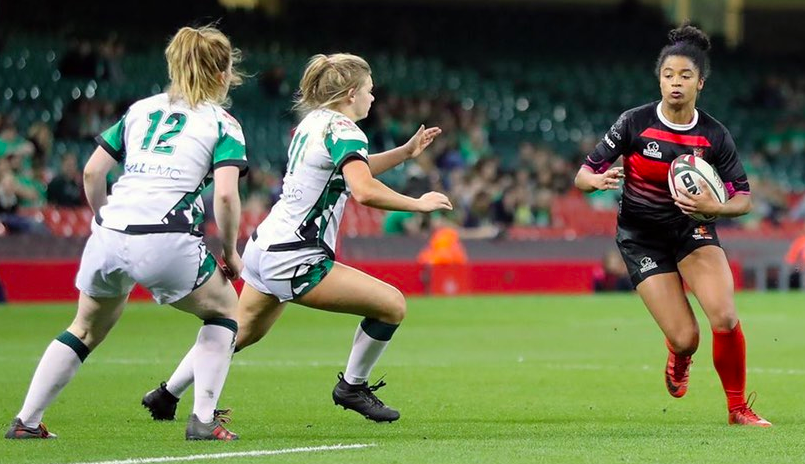
Women play rugby too: Cardiff Ladies Rugby President talks of gender disparities within the sport
“Something needs to give”
Rugby has existed since the 19th century and has traditionally been deemed a male sport. But now it’s the 21st century and more and more women are becoming fed up with this legacy. We spoke to the President of the Cardiff University Ladies Rugby Club, Verity Butt, about the gender disparities that exist within rugby. She offered her thoughts on women’s rugby as it is today, what the problems are and the potential solutions to overcome them.
Rugby isn’t seen as a woman’s career
Verity began playing rugby at the age of fourteen, having to hide it from her father because he had condemned her for playing. She told The Cardiff Tab, “I was very much the brain of the family and so the goals for me were always set under the bracket of academia”. Along with hundreds of girls across the country, Verity began playing to prove a point.
Young girls are told “it’s too dangerous, it’s too aggressive, it’s for boys, it’s not a career”, so there’s no surprise that numbers in the sport are lower than men’s.

As children, many girls are steered away from rugby by their parents, but the barriers don’t stop when you become an adult. Verity told The Cardiff Tab that, “financially there is very little backing than in the mens’ side”, meaning “most women have a full-time job,” so they cannot have a career in rugby.
There’s a constant need to challenge stereotypes
Former Harlequin’s Development Team player, Verity, explained that the challenges stem from perceptions as a child. As a child she participated in athletics, ballet, drama, football, hockey, karate, netball, and several other activities. Yet, rugby was not one of them. She told The Cardiff Tab that although rugby isn’t seen as a female sport, “it prepares you for life. It teaches you to get up when you’ve been knocked down. Quite literally.”
Rugby taught Verity that, “working on a team or as a family is more effective than trying to do everything by yourself”, so why are girls still being discouraged from playing the sport when it teaches such vital life lessons?

When we asked the club President if she thought that there were stereotypes surrounding women in rugby, to which she responded, “100%. There is this concept that every woman in rugby is loud and defensive, on the larger side, aggressive.” She also added that “unfortunately there is this very strong notion that everybody in women’s rugby is a lesbian which definitely is not the case. The purpose of rugby is to be inclusive no matter your shape, size, colour or sexuality.”
The barriers women in rugby face
There are countless barriers to women in rugby, including more expensive equipment, fewer coaches, and lower funding than their male counterparts.

Verity explained that, “there needs to be a perception change before anything. This will cause a chain reaction of funding, coaches, interest and publicity. Whatever it is. Something needs to give”.
Why women’s rugby is the best sport
When we asked Verity what her favourite things about rugby are, the list was endless. “I think the best thing about playing rugby as a woman is you are constantly defying all the odds.” Regardless of background, education or social exposure, Verity explained that, “the only thing that matters is the effort you put into those 80 minutes.”

Verity has always been athletic, and previously played five other sports at a high level, but told The Cardiff Tab that it’s the, “immense bubble of camaraderie,” that makes rugby the best. She explained, “women’s rugby is about the only sport that will always have a hand there for you when you’re on the floor, or a pat on the back when you’ve scored a try, or even a ‘don’t worry’ when you knock-on the ball, and that is what makes it the best sport.”
Keeping women in rugby
One of the reasons women struggle to stay in rugby throughout adulthood is because women’s rugby is not accessible everywhere, if you were to move for a job or other reasons. Verity told us, “there is no guarantee that there would be a club nearby and even if there was, the level they play at may be much lower or higher than you”, which can stunt your progression.
When we asked the club president what she thought needed to be done to improve women’s rugby, she told us that it’s about, “persuading adults that sport is a good confidence builder, life skill and can sometimes make or break a university application.”
“The more role models there are, the more chance we have”
Anger recently arose within the sport, when clothing retailer ‘Canterbury’ used models instead of female rugby players in an advertising campaign whilst the male players of the Irish team were chosen to model their own kits.
A Wasps Ladies player, Florence Williams, took to twitter to explain that, “by not using female players to market THEIR OWN KIT an opportunity to build recognition, fan bases & creating role models for future generations is lost.”
We asked Verity to comment on Canterbury’s error, to which she replied, “Honestly, I was upset but not surprised. I think it just highlights the attitudes to women’s sport as a whole. We are forgotten.” She went on to explain that, “I think it’s disgusting to allow a comparison between three stars and three models. It’s an insult and the response depicts how enraged our whole community was.”
By having more role models, it gives female rugby players a better chance at improving both the interest in the sport and the attitudes towards it. Verity gave us a list of “countless role models in the sport: Shaunagh Brown, Cerys Hale, Leanne Riley to name a few. How are we not utilising this more?”
“Don’t let anybody get in your way”
We asked Verity what she would say to young girls wanting to play rugby, to which she replied, “don’t let anything or anybody get in your way. She added, “there will always be a helping hand somewhere along the ladder, as long as you’re willing to keep climbing up. There will be some times you get knocked down and lose faith, but perseverance will be your best friend”.
Verity explained that she wants people to know it’s not about being better than men, it’s about being equal and getting the same opportunities and the same chance to succeed: “it’s about doing what’s right”.









































